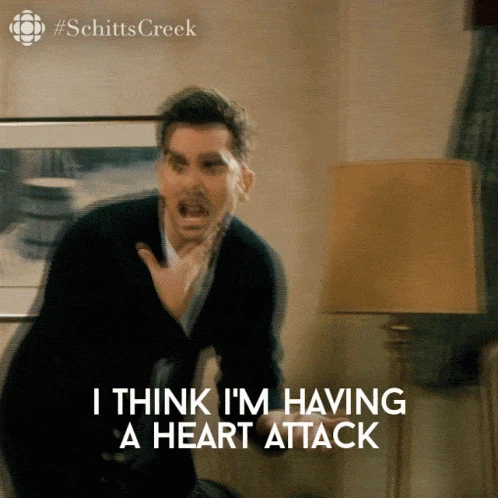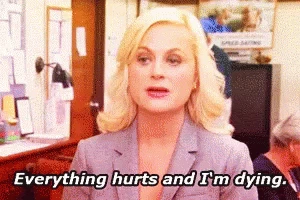Why You’re Stressed, According To Which Body Part Hurts
The impact stress can have on your body is completely underrated. The body is a very complex thing. You might not realize it, but the pain, pressure, or feelings from your body are signals that are trying to get a message to you. This is why it’s important to take care of your body and listen to its cues.

Let’s start with an example. For those of us who get chronic migraines, you probably know what your triggers are. For instance, some days I forget to take care of myself at work. I get too busy, I’m on my feet all day, forget to eat, am way overstimulated, and I start to feel a migraine coming on. I inevitably end the night laying in a dark room with an ice pack on my throbbing head. Along with the migraine, I get dizzy and sick to my stomach.
My body is reacting to the environment I put myself in, and it’s trying to tell me to make a change. Obviously, we can’t always avoid stress, and sometimes we just have to treat it as needed so that it doesn’t get worse. Psychology Today suggests that we store our stress in different parts of the body. It says that we express certain types of tension or negative emotions through different body parts. If you’re someone who struggles to be aware of their emotions, and only really notice that you’re upset or stressed about something when you feel a physical pain, then this breakdown can help you figure out what’s bothering you.
Lower Back = Anger
When we’re angry and we bottle up the anger rather than doing something with it, our back tends to hold the tension.

Stomach and Intestines = Fear
When you’re afraid, you tense your stomach, and your body responds to it with pain. This makes sense to me because whenever I’m very anxious, I get sick to my stomach.

Heart and Chest = Hurt and Sadness
If you’re sad about a loss or a breakup, that “heartache” or “broken heartedness” can also be a physical chest pain.
WebMD backs this up, saying, “psychological distress triggers sudden weakness of the heart muscle. It can be caused by sudden shock or acute anxiety. Doctors call it ‘stress-induced cardiomyopathy’ or ‘takotsubo myopathy.’”

Headache = Loss of Control
Just like when I get overstimulated and it triggers a migraine, when you feel like you’ve lost control, it can trigger headaches. The American Psychological Association explains that the tensed muscles in your shoulders, neck, and head caused by the stress of chaos or uncertainty can give you a headache, whether a tension headache or a migraine.

Neck/Shoulder Tension = Burdens and Responsibilities
Tension in the neck and shoulders can build up when you feel burdened or overwhelmed with the things going on in your life. The saying “I have a lot on my shoulders” can feel quite literal!

Fatigue = Resentment
Resentment can put stress on the entire body, causing it to tense and making you feel fatigued.

Breathing Difficulties = Anxiety
When anxiousness takes over, it can cause you to feel tightness in your chest and like you can’t breathe. Similar to when you have a panic attack, the body can respond by gasping for air.

The Body’s Reaction to Stress
Stress does more to the body than people may realize. Chronic stress can give you heart issues, high blood pressure, hormonal imbalance, increased inflammation in the body, and more. It can affect your weight, because when you’re stressed, you may tend to eat more or less than usual, and then it also affects your bowel movements.
What happens in your life can affect how you feel and think, and then your body reacts to that. This is why it is so important to take care of yourself, whether it be through emotional therapy, physical therapy, diet, exercise, and just day-to-day lifestyle habits.

Remedies To Help Reduce Stress
Ivy Rehab Network recommends these things to help manage stress:
Aim for 30 minutes of moderate exercise at least five days per week
Reduce caffeine, alcohol, and sugar intake
Get enough sleep each night
Avoid cigarettes and drugs
Think positively and surround yourself with positive people
Spend time outside in nature
Here are some basic stretches and exercises for different types of stress-related pain in the body:
Neck exercise – Lower your chin to your chest for 15 seconds and gently let the weight of your head create a stretch through your upper back. Next, gently drop your head towards the right for 15 seconds, then to the left side for 15 seconds.
Shoulder rolls – While sitting or standing, maintain good posture and roll your shoulders up, back, then down. Repeat this circular motion 10 times. Then do the opposite and roll your shoulders up, forward, then down. Repeat 10 times.
Upper and Mid back – Using a chair, sit facing forward and allow your upper body to fall over the back of the chair. Extend your arms above your head for a deeper stretch. Hold either position for five seconds, then release. Repeat three times.
Lower Back – Lie face up on the floor. Bend your left leg and bring it to your chest. Hold for five seconds, then release. Repeat with your right leg. Do this three times.
Breathing exercise – Let your breath flow as deep down into your belly as is comfortable. Try breathing in through your nose and out through your mouth. Breathe in gently. You can count steadily from one to five. You may not be able to reach five at first. Then let it flow out gently, counting from one to five again, if you find this helpful. Keep doing this for at least five minutes.
How You Can Reduce Stress with 28
Meet the world's #1 free cycle-based fitness and wellness experience! Get daily exercise videos, nutrition tips, and emotional insights based on your body's natural cycle. Equipped with personalized exercise videos tailored to your cycle and advice on what nutrients to prioritize, 28 can help you feel your best, reduce your stress, and balance your hormones. To give your body what it needs, you need to listen to what it’s telling you.
Closing Thoughts
There is no way to completely avoid stress in your life, so sometimes you have to compensate for it and find ways to treat the issues you’re having. But if you want to avoid unnecessary stress, sometimes that means adjusting your lifestyle and adding better habits while also removing the bad habits. Listen to your body when you sense pain in a certain area, and see if it might be related to stress. Sometimes seeking medical care is necessary, but it might just mean getting better in tune with your body and making some simple lifestyle changes.
Sign up for 28 by Evie for free at join28.com and follow 28 on Instagram at @28wellness.